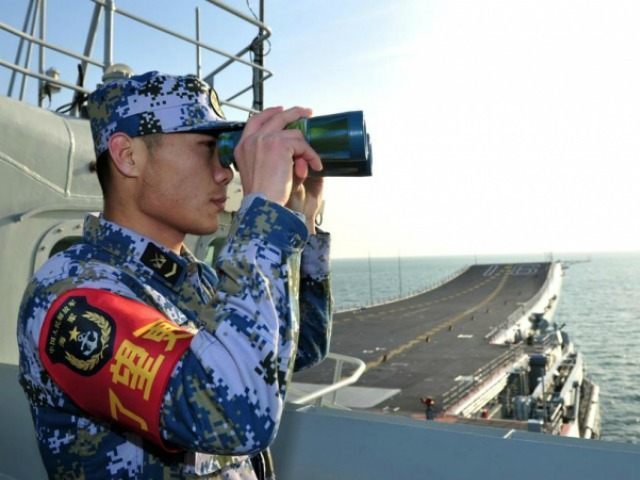The Japanese Defense Ministry has requested its largest budget ever, with a 2.2 percent raise following three years of steady increases that are powered by fear of U.S. passivity as China invades other countries’ territory in the South China Sea.
The UK Guardian cites China’s island-building in the South China Sea — near the Philippines and Vietnam — and its claims on the Japanese-held Senkaku Islands as the primary reason for Japan’s military buildup. The U.S. has only feebly protested China’s expansion, partly because President Barack Obama is cutting U.S. defense spending while he tries to expand progressives’ power and influence over the lives of U.S. citizens.
While Japan’s military reform is supported by the United States, it has met strong resistance from isolationist members of the Japanese public who wish their country to remain pacifist, after its disastrous decision to invade China and to attack the U.K., France, Holland and the United States during World War II. A demonstration against Abe’s military reforms drew some 120,000 protesters over the weekend.
The international disgust over jihadi expansion, such as the Islamic State, is also a factor in the Japanese policy. That disgust lets Prime Minister Shinzo Abe push for greater deployment of Japanese troops. Abe has cited the murder of two Japanese hostages by ISIS as a reason for changing the rules governing Japanese military deployments.
Abe has long maintained that Japan must shift its military posture to deal with new threats in a changing world, and to put its World War II imperial past behind it. From the 1930s until the U.S. dropped two nuclear weapons on Japan, Japan’s long imperial war in China killed roughly 20 million Chinese.
China, well aware that many on the Pacific Rim are worried by any discussion of Japanese troops fighting on foreign soil again, poured salt in those wounds by announcing a blanket amnesty for elderly criminals who also fought in what the state-run Xinhua news agency describes as World War II “the War of Resistance Against Japanese Aggression.”
“The mercy shown to [criminal] veterans is an apt recognition of their contributions in the wars, and it shows China’s attitude to history and commitment to peace,” said the Chinese government’s news agency. “While China remembers the fallen, jailed allies can not be forgotten despite their post-war missteps.”
China plans to hammer home its message about Japanese militarism by holding huge parades to commemorate the 70th anniversary of Japanese surrender on September 3, and drawing renewed attention to a ruined Japanese prison camp described as “China’s Auschwitz.”
In a similar vein, China expects everyone to view its construction of artificial islands festooned with artillery emplacements and military airfields as a commitment to “peace” in the South China Sea.
Much of Japan’s increased defense spending is earmarked for defensive radar systems, drones, and surveillance aircraft designed to keep an eye on what China does in the waters between Japan and Taiwan. The Japanese are also interested in putting more long-range weapons within reach of disputed islands, and beefing up a flexible, fast-response amphibious assault force.
Presumably much of this buildup is meant to signals to the Chinese that Japan is serious about protecting its interests in the region.
Japan hardly needs any new equipment to watch Chinese naval vessels putter around the nearby Senkaku Islands – as the Guardian notes, the Chinese did that for the 23rd time this year over the weekend, and the Japanese had no difficulty watching the show with their existing surveillance systems. But better detection systems and a rapid amphibious response force could project Japan’s sphere of concern farther out to sea.

COMMENTS
Please let us know if you're having issues with commenting.